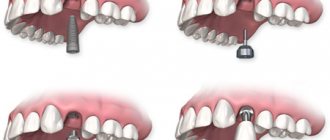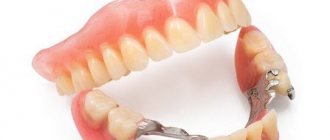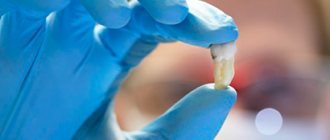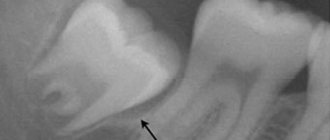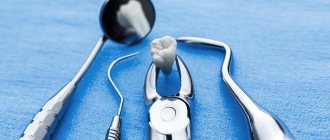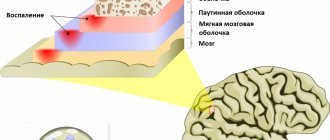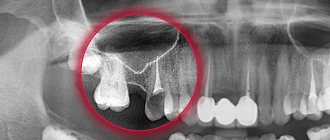Is it possible to treat teeth if you have a cold?
If the high temperature is caused by ARVI, herpes or other infectious diseases, then it is better to reschedule the appointment. The body at this moment is weakened and tuned to eliminate the disease, which means that the recovery process after dental treatment will be delayed. If you have a runny nose or cough, it will be difficult to sit in the dental chair during treatment. In addition, there is a high risk of spreading infection to the staff and other patients of the clinic.
However, there are situations when treatment cannot be delayed. In this case, you need to consult with your doctor, preferably by phone. He will decide whether to subject the weakened body to dental intervention or not.
How to eliminate toothache during colds?
Since it is better to postpone dental treatment during a cold, the question arises - what to do if the toothache is very severe? In such situations, you can use some methods to slightly reduce pain:
- Take painkillers. Medicines will help not only eliminate pain, but also lower the temperature, because, most often, they contain substances with a wide spectrum of action.
- Place a menthol pill or tablet under your tongue. During the resorption process, menthol will be released, which has an anesthetic effect and soothes pain.
- Rinse your mouth with a soda solution. This procedure must be repeated at least three times within an hour, after which a calming effect should occur.
- Make a compress or use various herbal infusions, for example, a decoction of sage or ginger root.
- Strengthen the treatment of colds. Quite often, toothache can be caused by a deterioration in the general condition of the body, and, therefore, the sooner the cold is cured, the faster the toothache will pass.
Do not forget that all of the above methods can only provide temporary relief from painful sensations, but they can help until you recover and, accordingly, contact a dentist. After the acute period of a cold has passed, you must immediately make an appointment at a dental clinic for further treatment of the tormenting tooth.
What if the cause of the elevated temperature is not a cold?
Often, an increase in temperature can be associated with inflammatory diseases in the oral cavity. For example, a cyst could form in a tooth or gum - a cavity filled with fluid. And elevated temperature is nothing more than the body’s reaction to protect itself from the spread of infection.
In an advanced state, the cyst affects neighboring teeth, so if you notice such symptoms, you need to consult a dentist.
By the way, a dental cyst is diagnosed using an x-ray - this is one of the reasons why it is necessary to undergo regular check-ups with a doctor. Treating the cyst at an early stage will protect you from possible complications, including tooth extraction.
What a high temperature may indicate
Dentists note that the temperature mainly increases after the removal of wisdom teeth, impacted units, or with a concomitant inflammatory process.
When a patient has a temperature of 38 °C or more for several days after wisdom tooth removal, the reason may be the development of:
- granulomas (nodular formations) - pathological formations form on the remains of roots that the doctor did not remove at the extraction stage;
- alveolitis (inflammation of the socket) - the provoking factor is violation of the dentist’s recommendations for wound care, perforation of the walls during surgery, weak immunity or inflammation of the throat;
- osteomyelitis - a process of purulent-necrotic damage to the jaw bone, with a high probability of abscess and gangrene;
- hematomas - occur when blood vessels are damaged during extraction and can provoke a purulent process and the formation of a cyst;
- infections - lack of proper care and antiseptic treatment will lead to rapid penetration of infection into the hole and the development of a pathological process.
After tooth extraction, the temperature may rise due to concomitant sinusitis. It is possible that the dentist may make mistakes, which, in addition to damaging the walls of the socket, may involve leaving foreign bodies (for example, a cotton swab) in the open wound or insufficient treatment of the socket.
Temperature after dental treatment
A slightly elevated temperature after dental treatment is a normal reaction to intervention in the body’s tissues, especially after treatment of complex diseases (pulpitis, periodontitis). Sometimes weakness and drowsiness may appear, which can be relieved with antipyretics, but you should not get carried away with them.
If three days have passed after treatment and the fever does not go away, you should consult a doctor: he will conduct an additional examination and prescribe the necessary treatment.
In what other cases does hyperthermia occur?
A visit to a maxillofacial surgeon and surgery is a stressful situation. The temperature can rise even against the background of emotional experiences.
Possible reasons for the increase in temperature after molar extraction:
- ARVI, acute respiratory infections, relapse of tonsillitis - intervention in the oral cavity causes a decrease in immunity. Therefore, surgery can be a provoking factor in chronic sore throats, making the patient more susceptible to pathogenic flora. Rhinorrhea, sneezing, coughing, and pain when swallowing are added to hyperthermia.
- Alveolitis is an infection of the tooth socket. After its removal, a blood clot forms in the socket.
- Its task is to prevent wound infection. If the doctor's recommendations are not followed - eating, chewing on the operated side, frequent rinsing - the clot detaches and the wound becomes infected. The result is inflammation, pus, severe pain and an increase in temperature to pyretic values.
- Mistakes by a dental surgeon when removing a tooth include excessive tissue trauma, leaving fragments and parts of the root in the socket.
If any unpleasant symptoms appear after removal of a molar, incisor or molar, you should contact an oral and maxillofacial surgeon.
When is tooth extraction necessary?
Modern dentistry gives preference to treating teeth to preserve them, but there are pathologies that require removal due to the high risk of complications.
The procedure can be performed urgently or planned. If the tooth is removed after preliminary preparation, the likelihood of complications is minimized. With emergency extraction, negative consequences occur more often. The following pathologies may be indications for tooth extraction:
- damage to the root canal or root;
- periodontitis or periodontitis;
- deep caries, accompanied by significant destruction of the crown;
- advanced hypoplasia;
- neoplasms in the tooth area;
- planned installation of an orthopedic or orthodontic structure;
- developmental anomalies.
Depending on the indications, tooth extraction can be performed using a simple method or surgically. The more tissue is injured, the more severely the body reacts to the intervention.
Is the temperature normal or not?
Many patients wonder whether the temperature can increase after tooth extraction? Dentists answer this question positively. Extraction, even despite the quality of modern dental services, causes physiological and psychological stress. After tooth extraction, a temperature of up to 37 °C is considered normal. If the removal was difficult, other signs may be present: swelling of the soft tissues, redness of the gums and slight bleeding. The patient also often feels dizzy and weak. These symptoms disappear within the first day.
Depending on how long the temperature lasts after tooth extraction, we can talk about the risks of pathological processes. A high rate or persistence of temperature for more than 2 days is a sign of an inflammatory process. Accompanying symptoms: the general condition may deteriorate greatly, the gums are very painful, and pus begins to ooze from the socket.
Because immediately after tooth extraction, the hole remains unprotected, and infection can penetrate inside, causing inflammation and other pathological processes. If your condition worsens on the second day after visiting the dentist, you must immediately visit the clinic to avoid further development of the disease.
Periostitis
If periodontitis is not treated on time, it can turn into an even more unpleasant disease - periostitis , when inflammation affects the jaw bone and flux forms in the periosteum. An abscess appears near the diseased tooth, from which in severe cases pus leaks out. Periostitis is characterized by fever , toothache , swelling of soft facial tissues , swelling of several teeth, gums, and poor general health. The pain sometimes moves, for example, to the temples and ears.
After implantation
Implantation is an operation to implant an artificial titanium root into the bone tissue of the jaw , on top of which, after regeneration is completed, an abutment and crown are fixed. Such treatment is always difficult and traumatic. It is performed under local anesthesia and requires long-term rehabilitation.
Meanwhile, it is implants that make it possible to restore the integrity of the dentition without damaging healthy units. Their installation is not associated with grinding down the “neighbors” or root canal treatment. Implantation is indicated if the tooth is completely destroyed, and even its roots are unsuitable for prosthetics.
Dentists always warn that after installing a titanium base, an elevated temperature may persist for three to five days, and this is normal. Fever indicates the active occurrence of regenerative processes. To avoid possible complications, the patient must take medications prescribed by the implantologist strictly according to schedule.
It is important to understand that the line between normality and pathology is very thin. Fever after implantation can also be a dangerous signal. So, sometimes it indicates rejection of an artificial structure. Then the person feels severe pain in the area of the surgical intervention, observes swollen gums from which pus is released, and constantly feels an unpleasant taste in the mouth. Soon the implant becomes mobile, which indicates its active rejection.
In this case, there is no point in hoping that the situation will normalize on its own. You need to go to the doctor immediately. The sooner the patient visits the doctor who implanted the implant, the higher the chances of stopping further progression of inflammation. If time is lost, the titanium base will most likely have to be removed.

